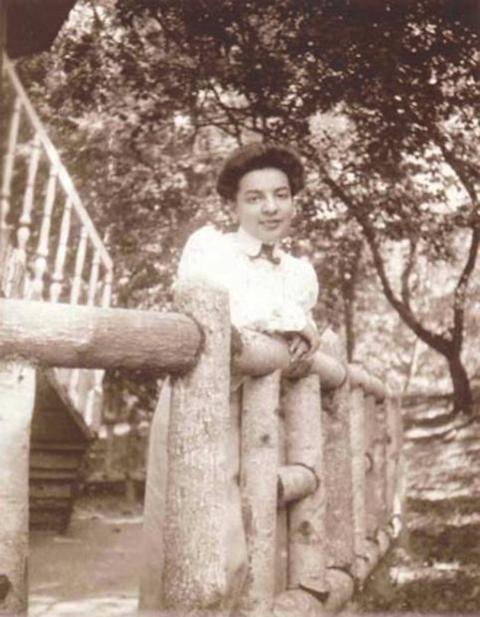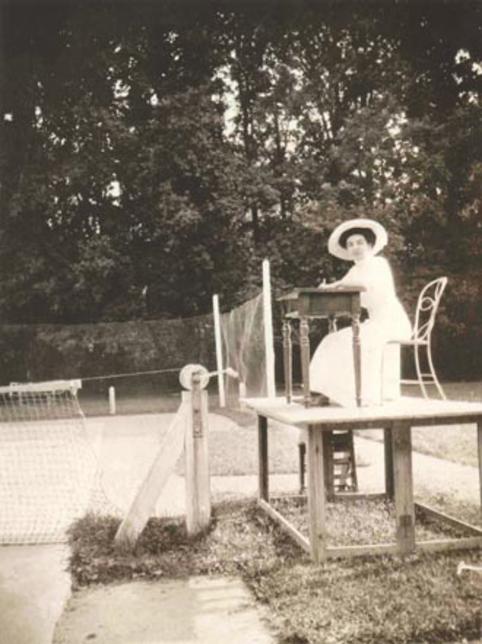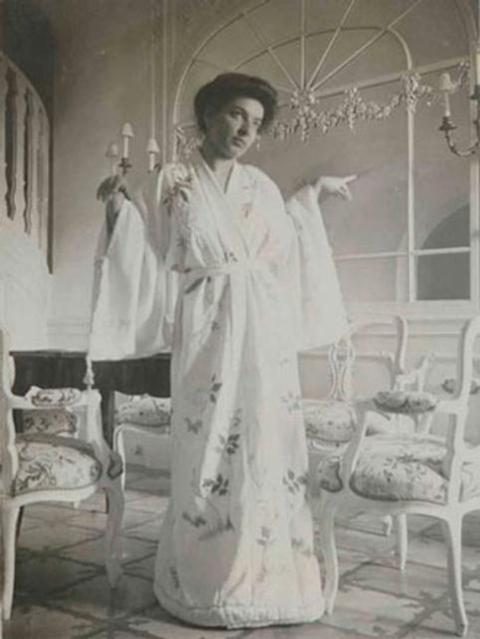
Sponsored Ads
|
» Home
» Music » Cheah Chan Duo open Nov 13 2015 DiMenna concert with music by Croatian composer Dora Pejacevic
| Cheah Chan Duo open Nov 13 2015 DiMenna concert with music by Croatian composer Dora Pejacevic |
| By Nenad N. Bach and Darko Žubrinić |
Published
11/9/2015
|
Music
|
Unrated
|
|
|
|
Song by legendary woman composer Dora Pejačević included in International Art Song Recital featuring a world premiere
Dora Pejačević, portrait by Maxo Vanka, distinguished Croatian painter
Song by legendary woman composer Dora Pejačević included in International Art Song Recital of repertoire spanning three centuries and also featuring a world premiere
The Cheah Chan Duo are thrilled to be opening Some Enchanted Evening, the first concert of their seventh season—and their first appearance at the DiMenna Center for Classical Music (450 West 37th Street)—on Friday the 13th of November at 7:30pm (tickets are $20 at the door) with an art song by Dora Pejačević (1885-1923), one of the most significant Croatian composers of the early 20th century and one of the most important woman composers from that time as well. Author of over a hundred works including a symphony, the first piano concerto penned by a Croatian composer, several formidable large-scale chamber music compositions, and some 33 art songs, Pejačević began composing at the age of 12 and continued up until the time of her untimely death (from complications following a difficult childbirth) at the tender age of 37. Her life is the subject of the 1993 Croatian motion picture Kontesa Dora.
Trudy Tong Ti Chan, originally from Hong Kong, where she worked as a pianist, harpsichordist, choral conductor, and musicologist, she is currently based in New York City.
The song “Ma bilo nekoć” (“It was a long time ago”), the final song in a set of seven composed when Pejačević was merely 22, is based on a poem by the Countess Wilhelmine Wickenburg-Almásy (1845-1890). As were the majority of texts created in lands under the control of the Austrian Empire at that time, Wickenburg-Almásy’s original poem, as well as Pejačević’s setting of it, is in German (“Es war einmal”). Wickenburg-Almásy’s melancholy poem is matched by Pejačević with music full of soaring chromatic harmonies—a harbinger of Pejačević’s subsequent musical language; it is the perfect opening for the Cheah Chan Duo’s international art song recital of musical musings on magic, myth and the macabre, a program spanning three centuries which also features songs by Felix Mendelssohn, Robert and Clara Schumann, Camille Saint-Saëns, Pejačević’s contemporaries Jean Sibelius and Amy Beach, a solo piano work by Mischa Levitsky, a pair of songs created expressly for the duo by North Carolina-based composer Jonathan David, and the world premiere of a song setting by New York City-based composer Frank J. Oteri of a poem by another Pejačević contemporary, William Butler Yeats. The Cheah Chan Duo will be performing from the first critical edition of Pejačević’s complete songs, edited by Ivan Živonović and Davor Merkaš, which was published in 2009 by the Croatian Music Information Centre.
Phillip Cheah, born in Singapore, is currently based in New York City where he maintains an active professional life as a conductor, vocalist, pianist, and teacher.
The Cheah Chan Duo, now in their seventh season, have performed at the Church of Saint Luke in the Fields, the Tenri Cultural Institute, Cornelia Street Café, and Symphony Space’s Leonard Nimoy Thalia as part of the 2011 Music of Now Marathon. Their concert programs have included a 90th birthday tribute concert to Ned Rorem, an evening devoted to the music of Frank J. Oteri (featuring the world premiere of the ASCAP Foundation Charles Kingsford Fund commissioned song cycle Versions of the Truth, composed expressly for them) and four nation-themed programs: an evening of French mélodies and short instrumental pieces for Bastille Day; a Time Out New York-featured program of British art songs; an American evening; and a German/Austrian liederabend. They have additionally premiered songs written for them by Chris Cresswell, Jonathan David, and Drew Hemenger.
Dora Pejačević on Croatian postage stamp, published in 2014.
Designed by Dubravka Zglavnik Horvat.
The DiMenna Center for Classical Music was built for the Orchestra of St. Luke’s in 2011 and is New York City’s only acoustically-optimized rehearsal and recording space dedicated to classical music. It has quickly become an unparalleled resource serving the entire musical community—from soloists to symphony orchestras—as a choice location for performances as well. The DiMenna Center is located just a few blocks away from the 1902 Roman Catholic Church of Sts. Cyril & Methodius and St. Raphael (502 West 41st Street) which serves Croatian worshippers from four states: New York, New Jersey, Connecticut and Pennsylvania.
|  Dora Pejačević (1885-1923) at the Pejačević Palace in Našice, Croatia, 1904. Source www.mgz.hr
Prva hrvatska skladateljica Dora Pejačević
PaviljonLjubav prema glazbi u obitelji Pejačević i u njihovim dvorcima u Našicama osobito su njegovale Gabrijela, žena Ladislava, i Lila, žena dr.Teodora, koje su bile i pokroviteljice Hrvatskoga glazbenoga zavoda u Zagrebu. U jakom glazbenom ozračju rodila se i rasla Teodora, poznatija pod imenom Dora, najstarija kćerka dr. Teodora grofa Pejačevića.
Dora Pejačević (1885.-1923.) istaknuta je hrvatska skladateljica koja je, na žalost, kao i mnogi drugi umjetnici, bila poznatija i cjenjenija u inozemstvu nego u Hrvatskoj. Živjela je za glazbu i u glazbi u doba koje je u hrvatskoj muzici obilježeno kao razmeđe zakasnjeloga romantizma lvana Zajca i takozvanoga nacionalnog stila. Njezina ljubav u glazbi pripadala je Richardu Wagneru i Gustavu Mahleru, a očit je utjecaj Roberta Schumanna, Johannesa Brahmsa, Edvarda Griega i Petra Čajkovskoga, zbog čega je glazbeni teoretičari često smatraju kasnoromantičarskom umjetnicom.
Njezina su djela bila na repertoaru mnogih uglednih umjetnika, a ime joj se pojavljivalo na programima i koncertnim plakatima s najvećim svjetskim skladateljima. Muzikolozi ističu da je postavila temelje novijoj hrvatskoj komornoj i koncertantnoj glazbi. Od njezinih 58 opusa, nastalih između 1897. i 1922. godine, najpoznatije joj je djelo klavirski koncert iz 1913., poznat kao prvi klavirski koncert u hrvatskoj glazbi te, po mnogima, najuspjeliji rad – simfonija u fis-molu iz 1918. godine.
Izvor nasice.hr
|
The first Croatian female composer Dora Pejačević
PaviljonThe love towards music in Pejačević family and in their mansions was nurtured by Gabriela, Ladislav’s wife, and Lila, Teodor’s wife, who were also sponsors of Croatian Music Institute in Zagreb. Teodora, known as Dora, the oldest daughter of Count Teodor Pejačević, was born in a strong musical environment.
Dora Pejačević (1885-1923) was a renowned Croatian female composer, who was, as it is often the case with other artists too, more famous and renowned abroad than in Croatia. She lived for music and with music, during the time when Croatian music was at the crossroad between late romanticism of Ivan Zajc and the so-called national stile. Her was mostly influenced by Richard Wagner and Gustav Mahler, but she was also influenced by Robert Schumann, Johaness Brahms, Edward Grieg and Pyotr Ilyich Tchaikovsky, which is the reason why music theorists often put her in the period of late romanticism.
Her works were played by many famous artists, and her name could have been found on programs and concert announcements alongside the names of world’s greatest composers. Musicologists point out that she set the foundations of newer Croatian chamber and concert music. Out of her 58 works, written between 1897 and 1922, the most famous piece is a piano concert written in 1913, known as the first piano concert in Croatian music and according to many, her most successful work is a symphony in F-sharp minor form 1918.
Source nasice.hr
|  Dora Pejačević at the tennis playground near the Pejačević Palace in Našice, Croatia 1912. Source www.mgz.hr
DORA PEJAČEVIĆ (1885. – 1923.)
Hrvatska skladateljica Dora Pejačević, kći hrvatskog bana grofa Teodora Pejačevića, pripada naraštaju hrvatskih skladatelja koji je oblikovao hrvatsku glazbenu modernu. Rođena je u Budimpešti, a odrasla je u obiteljskom dvorcu u Našicama gdje je privatnom poukom stekla kvalitetnu naobrazbu. Glazbu je studirala u Dresdenu i Münchenu.
Često je putovala susrećući se i komunicirajući s velikim umjetnicima onog doba, kao što su pjesnik Rainer Maria Rilke, književnik Karl Kraus i slikar Maksimilijan Vanka. Ta su poznanstva utjecala na autoričino stvaralaštvo duhovnim bogatstvom koje je stjecala kroz godine takvih susreta i unosila u vlastito djelo, produbljujući i izrazom i složenošću zapisa tradicijom naslijeđene kodove glazbenog mišljenja.
Najvažniji dio skladateljičina opusa nastaje u godinama Prvoga svjetskog rata. To su skladbe koje nedvojbeno pripadaju hrvatskoj glazbenoj antologiji 20. stoljeća. Riječ je o Koncertu za glasovir i orkestar u g-molu, op. 33, prvom takve vrste u hrvatskoj glazbi, slijedi Glasovirski kvintet u h-molu, op. 40, potom violinske i glasovirske sonate, prva moderna simfonija u povijesti hrvatske glazbe te niz izvanrednih popijevaka, koje podjednako izborom stihova, kao i skladateljskim rukopisom iskazuju osobine njezina misaonog svijeta.
Ujesen 1921. Dora Pejačević udaje se za austrijskog časnika Ottamara von Lumbea. Otad živi u Dresdenu i Münchenu, u kojem će nakon poroda umrijeti u dobi od 38 godina.
Posljednjih desetljeća njezin opus privlači pozornost stručnjaka pronalazeći put i do slušatelja. Sve se više djela objavljuje tiskom i na nosačima zvuka, čime su otvorene mogućnosti većeg zanimanja i izvan granica domovine za stvaralaštvo jedne od rijetkih europskih skladateljica prošlog stoljeća.
Erika Krpan
Izvor Hrvatska pošta
|
DORA PEJAČEVIĆ (1885 – 1923)
Croatian woman composer Dora Pejačević, daughter of the Croatian viceroy and count Teodor Pejačević, belongs to the generation of Croatian composers who shaped the modern period in Croatian music. Born in Budapest, she grew up in the family castle in Našice where she received quality private education. She studied music in Dresden and Munich.
She travelled often, meeting and communicating with great artists of her time, like the poet Rainer Maria Rilke, writer Karl Kraus and painter Maksimilijan Vanka. These acquaintances influenced her creativity by the richness of spirit which she acquired through the years of these encounters and which she included in her work, further deepening by the expression and complexity of her notation traditionally inherited codes of musical reflection.
The most important part of the work by the woman-composer Dora Pejačević was created during the First World War. These are compositions that undoubtedly belong to Croatian music anthology of the 20th century. We are talking here about Concerto for piano and orchestra in g-minor, op. 33, first of the kind in Croatian music, then Piano quintet in u h-minor, op. 40, followed by sonatas for violin and piano, first modern symphony in the history of Croatian music and many excellent composed songs that by the choice of verses as well as by composer's handwriting express the features of the world of her reflections.
In autumn 1921 Dora Pejačević married Austrian officer Ottamar von Lumbe. From that time she lived in Dresden and Munich where she died after giving birth in the age of 38.
During last decades her opus has attracted numerous experts and found its way to audience. More and more of her works have been published both - as written notes and as sound recordings which opened possibilities of greater interest also outside Croatian border in the work of one of rare woman composers of the last century.
Erika Krpan
Source Croatian Post
|  Formated for CROWN by Darko ŽubrinićDistributed by www.Croatia.org . This message is intended for Croatian Associations/Institutions and their Friends in Croatia and in the World. The opinions/articles expressed on this list do not reflect personal opinions of the moderator. If the reader of this message is not the intended recipient, please delete or destroy all copies of this communication and please, let us know!
|
Related Articles
Related Links
|
|